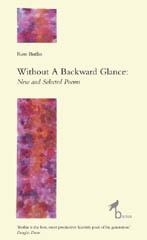Without A Backward Glance
Without A Backward Glance
 This collection of well over a hundred poems is made from a selection of works from Butlin’s six earlier volumes, the first published in 1974, and from 21 new poems. All of them celebrate in unmistakable voice the themes that have been constant in his work from the beginning: identity, memory, love, family, Edinburgh, and music. Where the selected poems are concerned, it can only be wondered why some have been given new breath on these pages, and others haven’t. But selections by their nature are, well, selective. Be that as it may, this is a damn fine selection which represents much of the best of his work over the last thirty years.
This collection of well over a hundred poems is made from a selection of works from Butlin’s six earlier volumes, the first published in 1974, and from 21 new poems. All of them celebrate in unmistakable voice the themes that have been constant in his work from the beginning: identity, memory, love, family, Edinburgh, and music. Where the selected poems are concerned, it can only be wondered why some have been given new breath on these pages, and others haven’t. But selections by their nature are, well, selective. Be that as it may, this is a damn fine selection which represents much of the best of his work over the last thirty years.
Butlin’s first publication, The Wonnerfu Warld o John Milton, is a long sequence on Milton and Paradise Lost, written entirely in Scots. This was first published in a limited edition of 100 copies and later appeared in Creatures Tamed by Cruelty. His second publication, Stretto, consists predominantly of works in Scots, though in subsequent volumes he has written almost exclusively in English. One of the Scots poems from Stretto, ‘Labbach’, whose title ironically glosses as ‘in a strange tongue’, shows Butlin’s complete control of the language: ‘Owre an on, lichtlie and fou,/the years faa awa in a smirr as the caul/cuts tae the bane,/I staun as the wund blaws throu:/an owre an on, yont me ayont you,/the years faa awa like thunner like sun/the same frae the stairt,/I staun yerd-fast an I grue.’ The power of these sentiments belies the ‘simplicity’ of the language. The eerieness of the imagery left me with a splendid grue. Given such control in his use of Scots in this lyric poem, one again has to wonder why Butlin abandoned Scots to write uniquely in English.
In the almost transcendent ‘Two Composers’, from Creatures Tamed by Cruelty, Butlin tentatively explores the ineffable mystery of Bach and Mozart. Here he is accorded a fugitive or momentary glimpse into the depths of their art and artistry, and from this provides a means of access to their music, ‘I see everything by the light held/in my shadow’s hand;/as I walk the candle-flame trembles./Bach steadies everything/even light./ And the fields and woodlands I’ll explore years later/become fields and woodlands now,/for moments at a time./ Mozart is very clear water/that seems only a few inches deep,/and yet you will never, never/touch the bottom/or, you will walk upon the surface/thinking that this is easy/and not the least miraculous.’ Art conceals art.
One of the pieces I am pleased to see in the selection from Ragtime in Unfamiliar Bars, is ‘Letting Go’, an elegy. Here Butlin exquisitely manipulates memory and language and feeling, and this is the result: ‘No longer a green orchard, nor blue;/for my hands are letting go/- even as you glance in my direction/my hands let go their jewels./No longer an orchard nor the ocean/we saw surrounding us/- for even the taste of salt and grit are the same,/like sea-spray and precious stones.’ Love has turned to loss, yet again Butlin’s simple images, the directness of the language, and the sharpness of the sentiments these invoke, are all hauntingly beautiful.
In the ‘Uncollected Poems’, which represent his more recent works, Butlin’s variety and range is as great as ever: poems in celebration of friendship and absinthe; a sequence in honour of the violin, which acknowledges the great importance of Neil Gow; a poem in praise of whisky-making; and one cautionary piece on the reconvening of our Parliament in 1999. As Freedom and Whisky gang the-gither, Butlin’s ‘Recipe’ instructs us to, ‘Wring the Scottish rain clouds dry;/Take sleet, the driving snow, the hail;/ Winter twilight; the summer’s sun slowed down/to pearl-sheen dusk/… And, most of all, take the years that have already run/to dust, the dust we spill behind us…/All this, distill. And cask. And wait/… Here’s life! Here’s courage to go on!’ Facing us portentously on the page opposite ‘A Recipe for Whisky’, is ‘A History of the Scottish Parliament’. Analogously charting the creation from Genesis, ‘God’s first week was a busy one:/universal chaos, light and darkness, stars, planets/and attendant moons’, though we are told that, ‘Come Sunday He stayed in bed’, Butlin reminds us that while ‘God was condemned to work alone’, in the creation of our own destiny, ‘we are not.’ With a prophetic but not pessimistic flourish, Butlin claims, ‘the history/we’ll make, will make us in return. Chaos/and Creation are now in our hands.’ A poem for a new age.
In his foreword to this collection, Edwin Morgan writes in high praise of Butlin’s work, concluding, ‘the writing is precise and thoughtful, the book will give much pleasure.’ This, I cannot gainsay.
Without A Backward Glance: New and Selected Poems. Ron Butlin. Barzan Publishing. (ISBN 0954970160 PBK £9.95)
© Michael Lister 2006

Comments